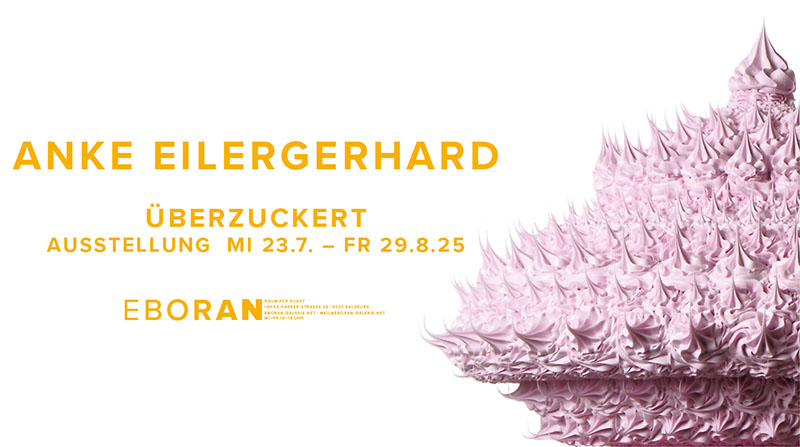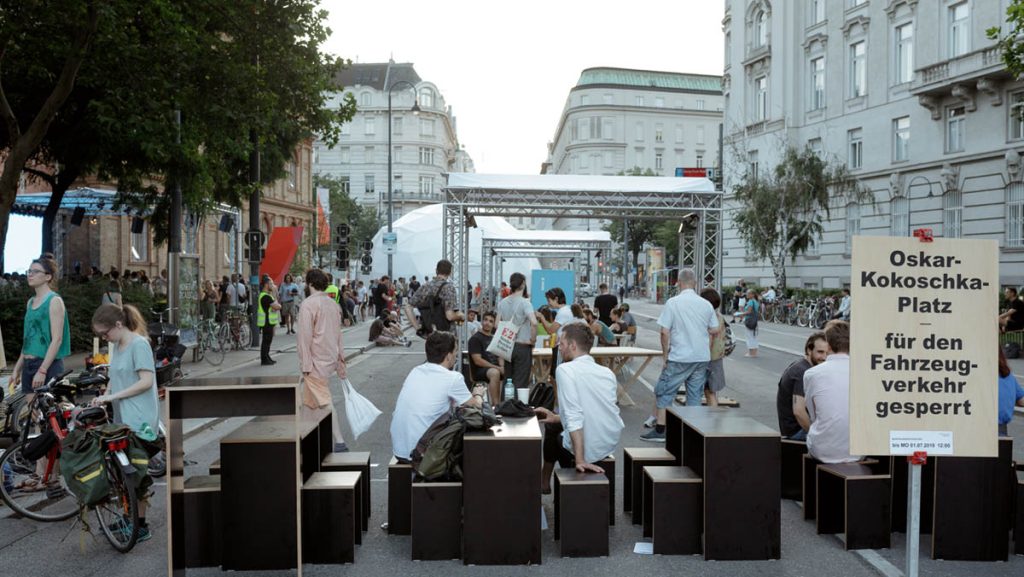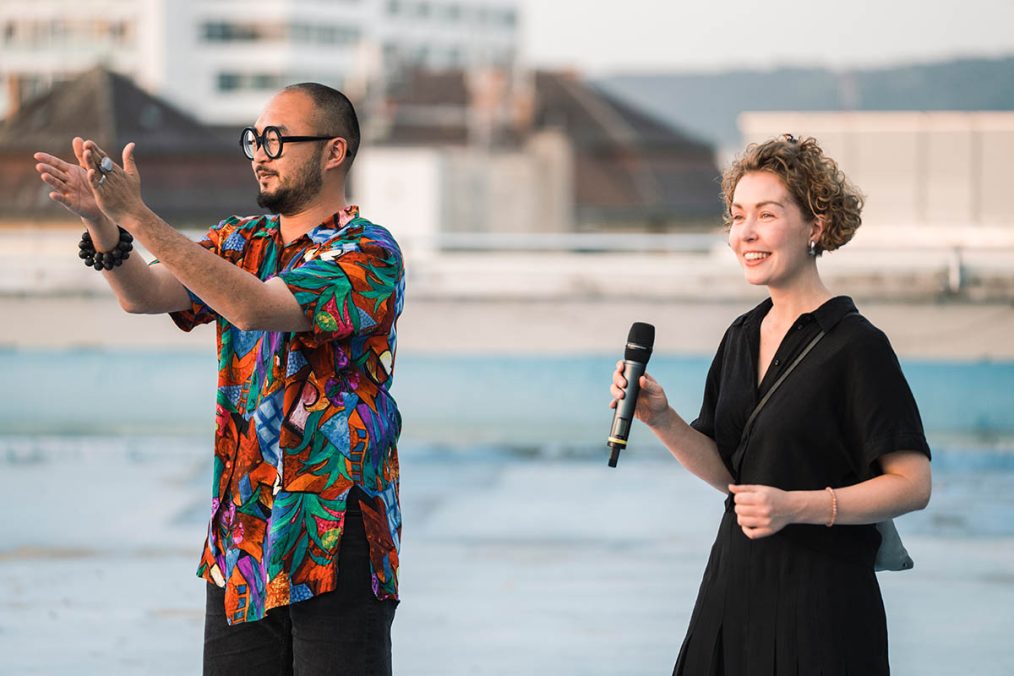
Congratulations on the first edition of this new festival!
Freda Fiala: Thank you, it was a significant premiere edition indeed. This first program involved over 30 artists who presented performances, it was a very energetic start! It was also the first collaboration of the Upper Austrian Landes Kultur GmbH (OÖLKG) with the Landestheater Linz and the Bruckner University.
Where exactly did it take place?
River Lin: We showed performances in the OK (Offenes Kulturhaus) and in the Musiktheater Linz. The large rooftop of OK has provided performative conditions for dramaturgies of conflating bodies and the urban landscape and its gallery spaces have been transformed into temporary theatres and assemblies through various performances. The program in Musiktheater took place in the Black Box with a lecture-performance, and in the Foyer with a dance intervention.
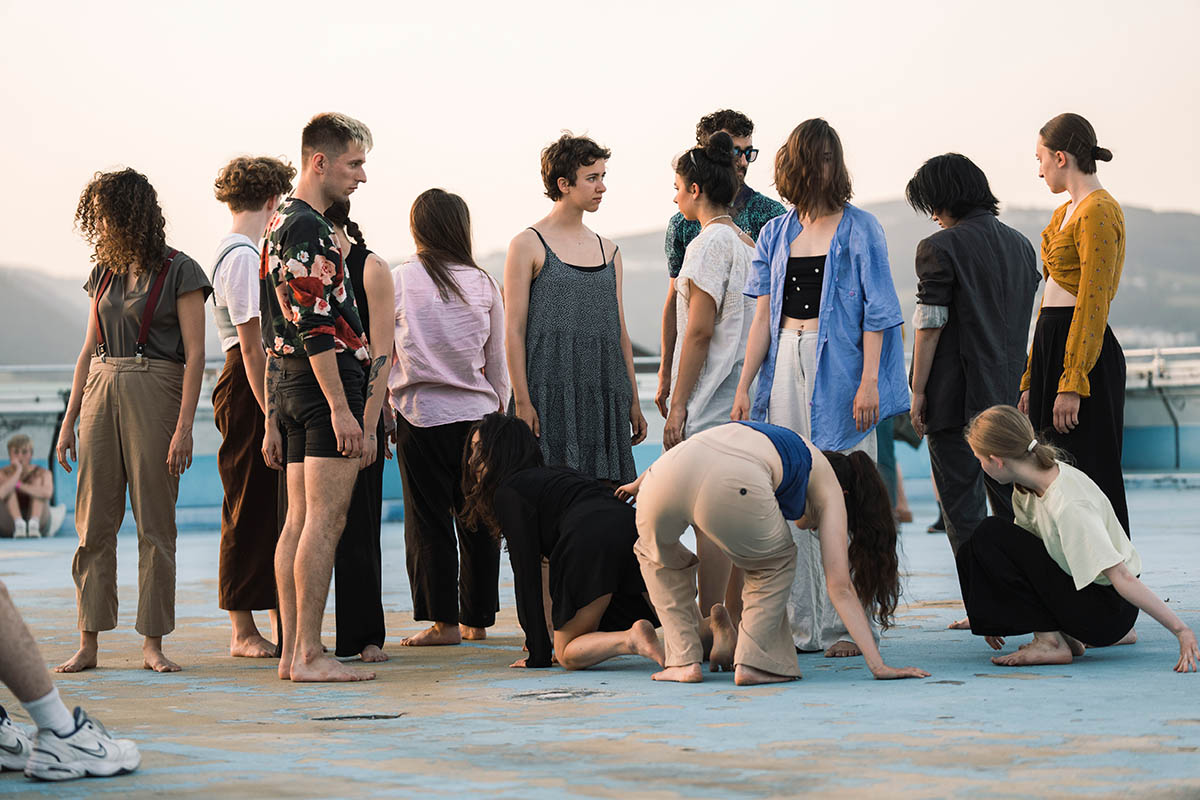
You have developed the idea and program as an Austrian-Taiwanese curatorial duo. How did you get to know each other?
Freda Fiala: My background is actually performance research, I focus on the East Asian region. During a longer period of my fieldwork, I met River in 2019. At the time he curated the festival “Camping Asia” in Taipei with Centre National de la Danse and Taipei Performing Arts Centre, a platform of workshops and performances for international artists and art schools. It left a deep impression on me as I felt there was a visionary aspect to it, assembling so many different people from across Asia and Europe. River’s practice as a regular host of performance-networking events engages with performance to facilitate intercultural spaces and spark connections.
River Lin: Freda actually follows a similar interest in her research, writing and dramaturgical practices as she has lived in Taiwan to deepen her engagement with contemporary performance in the cross-cultural context. Most performance artists’ modes of working are actually mobile practices and practices of exchange, for which trans-Asian and globally working institutions and networks can ideally provide a conceptual and productive geography.
Performance Art as a method of social exchange and connection –
River Lin: It is a crucial observation that the canon of Performance Art history is still organised in a Western-centric manner. We seek to gradually include more perspectives and knowledge from Non-Western regions, East Asia and the Global South.
Freda Fiala: What I observed in Taiwan was how relatively recent developments of regional performance art festivals and performing arts markets have progressive potential to impact both the aesthetic languages and visibility of artistic creations.
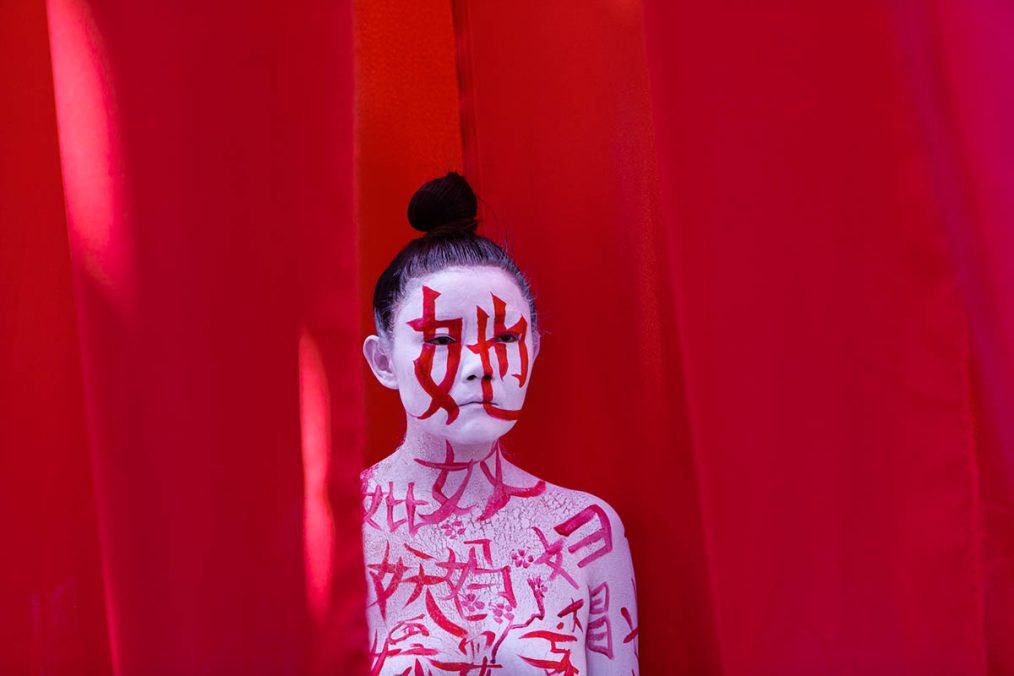
Does this question of performance art historiography feed into your program for Linz?
River Lin: Certainly. When working on this project together, we first considered the notion of archive. Archives reflect how the cultural discourse of an artistic genre develops. With “The Non-fungible Body?” we are putting up a performance program in a museum, an institution which, following a modernist imaginatory, generally dedicates to exhibiting and collecting object-based works of art. Performance is quite the opposite of such solidified form, yet it has to deal with the fact of its commodification and marketisation under economic conditions.
Freda Fiala: Performance in that sense captures what anthropologist Marcel Mauss termed as the “political economy of life”, as a central component of how societies are organised. Mauss differentiated between non-capitalist modes of gift exchange, characterised by impermanence and relational circulation, and their agentive directionality under capitalism.This book was already expressing about the dialectic of movement and stasis and the social impact of commodification in the 1920s.
Where did the idea “The Non-Fungible Body” come from?
River Lin: The title spotlights the question of affective valuing and the conditions of the artist’s body in the institutional realm of contemporary art. With “The Non-Fungible Body?” we wanted to embed the question of the performing body as a “physical currency” against the backdrop of most recent developments, which is why our title borrows from crypto jargon. It implicates the question how immaterial works of art are assigned value, a discussion that was sparked with the emergence of the NFT format.
Freda Fiala: In 2021 the Upper Austrian Landes-Kultur GmbH (OÖLKG) which hosts the performance festival in OK, has shown a seminal exhibition on NFTs in the context of New Media and Digital Art, titled “Proof of Art”. Our program for the festival was at the same time inspired by their exhibition and by performance related questions of (ir-) replaceability, documentation and archiving in the contexts of the virtual and the real.
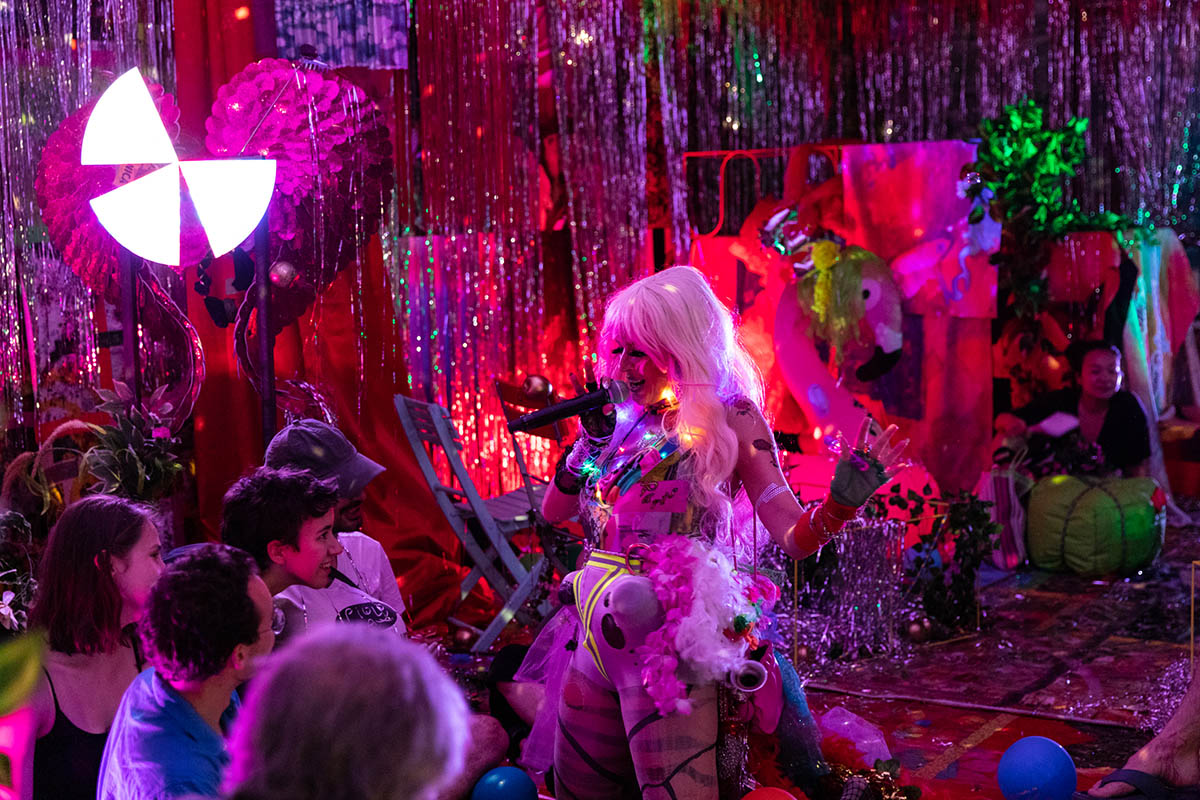
“Non-fungible Body” translates to the body being “a unique entity”?
River Lin: In performance, the artistic body itself is generally considered irreplaceable – “non-fungible”. Performance articulates through physical singularity and presence, embedded in and also holding up against the digitalised realities that we live in.
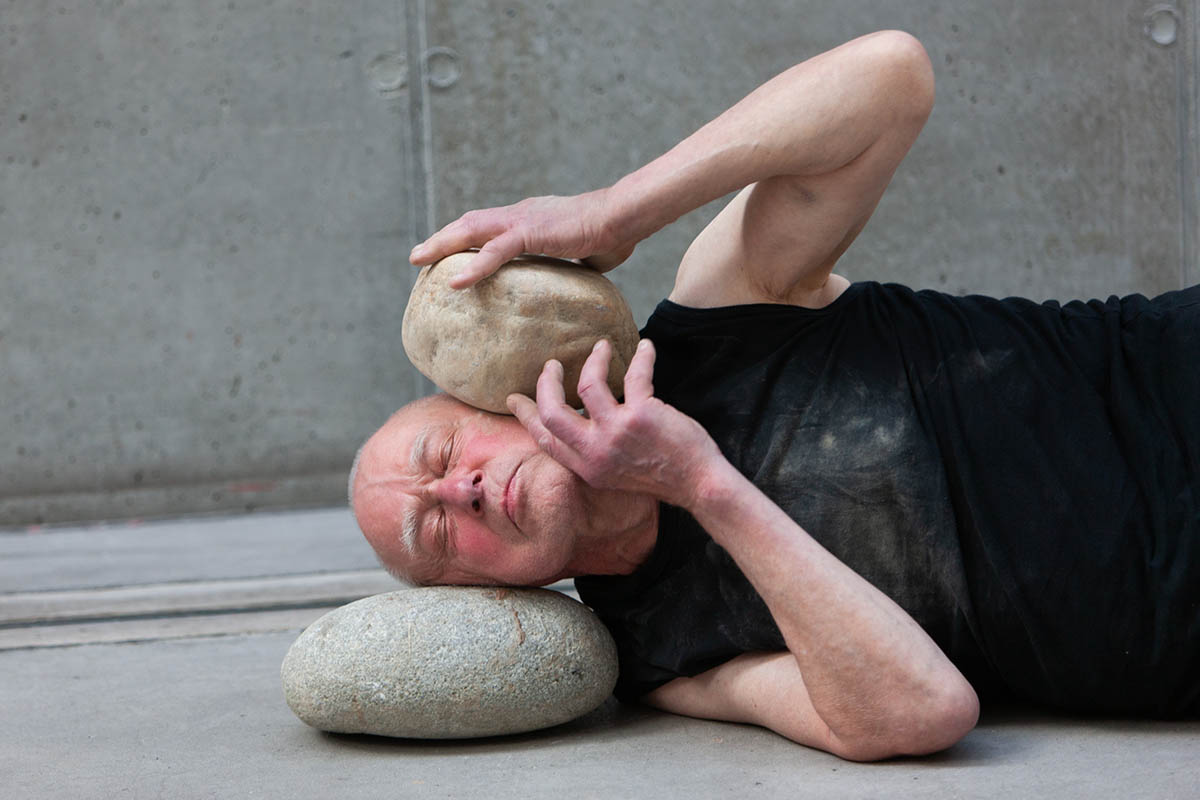
Since the early days of the genre in the 1960s, Performance has evolved into an umbrella term to discuss a broad range of practices. Which kind and style of performance did you invite to Linz?
River Lin: We see performance as an expanded artistic form and medium ranging over visual art, theatre, dance and digital culture. The question of the uniqueness of the artist’s body, which the program brings up, first relates to the notion of documentation and what it means to categorise performances as artistic works. Looking in this direction, legendary performance artist Boris Nieslony and choreographer Xavier Le Roy gladly joined us. Boris is a pioneering figure in the field, who over several decades has built an archive of performance art in Cologne. We are honoured that, as a “living archive”, Boris has returned to Linz through the festival. Xavier Le Roy presented his well-known piece “Product of Circumstances” that reflects on the dimensions and value of corporeal experience.
Freda Fiala: “The Non-fungible Body?” also looks at questions of performance-based artistic practices in relation to digitalisation. Cibelle Cavalli Bastos, known for their work with Augmented Reality in Web 2.0 and in the NFT-space, performed as who they call their high-femme alter-ego Sonja Khallecalon. During the festival, in a live-stream performance interview by David Henry Nobody Jr. and Anika Meier, audiences were invited to contemplate how the living body is embedded in the virtual, through consumer culture and constant sensory overstimulation. We also asked the visual and social media artist Jan Hakon Erichsen to take his works, that are usually performed for camera and online audiences, to the museum as real-time actions, while also streaming his live-performances online.
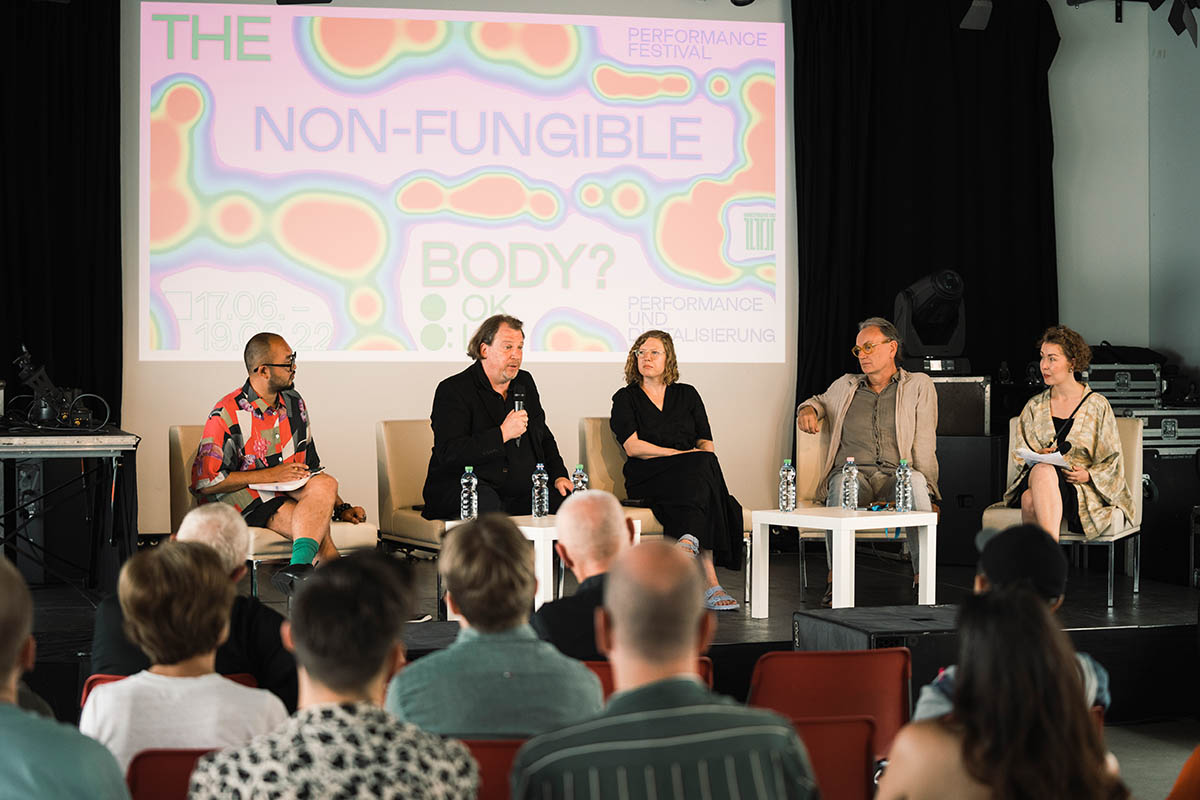
Where are you aiming to take “Non-fungible Body?” festival? Will it be there again next year?
Freda Fiala: We will be back next year with the second edition, and we are excited to see our next program develop over the upcoming months. Linz now has a performance festival!
Freda Fiala – www.instagram.com/freda_fiala/
River Lin – www.instagram.com/riverlin1984/



